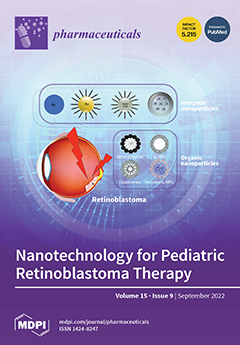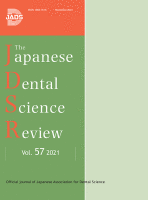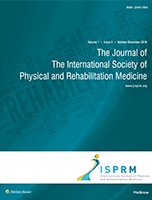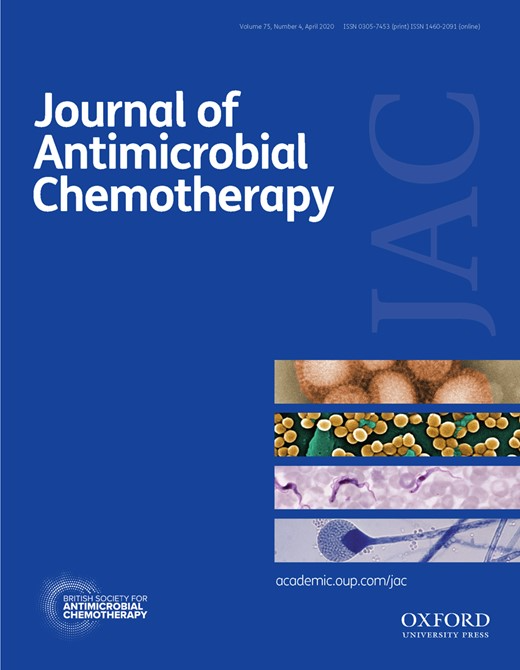Periodontitis
How to submit an article:
- Registered users can submit any published journal article that has a unique DOI (Digital Object Identifier) name or link to Research Hub.
- For example, you can paste the full DOI link:
https://doi.org/10.1109/5.771073or just the DOI name:10.1109/5.771073into the field above and click submit. - The person who is first to submit a valid article to Research Hub will forever be credited for it, and every article submission earns you +6 Research Points.
Published research studies are articles that present the findings of original research that has undergone a peer-review process and has been made publicly available in scholarly journals, books or other media.

Exploring the Clinical Applications of Lemongrass Essential Oil: A Scoping Review
2024 Jan 25 Pharmaceuticals Kusuma IY, Perdana MI, Vágvölgyi C, Csupor D, Takó M
Review Article Lemongrass Oil Dandruff Gingivitis Periodontitis LemongrassLemongrass essential oil can effectively treat periodontitis, gingivitis, oral malodour, skin aging, and dandruff, and it is comparable to certain established treatments.

Impact of Green Tea (Camellia Sinensis) on periodontitis and caries. Systematic review and meta-analysis
2021 Nov Japanese Dental Science Review Mazur M, Ndokaj A, Jedlinski M, Ardan R, Bietolini S, Ottolenghi L
Systematic Review Meta-Analysis Oral Health Green TeaGreen tea treatment has shown potential in improving oral hygiene and gingival health, and reducing periodontitis and caries.

Efficacy and Safety of Modified Yunu-Jian in Patients with Periodontitis: A Meta-Analysis
2021 Apr 26 Evidence-Based Complementary and Alternative Medicine Yuanyuan Yue, Meng Gao, Yanru Deng, Jiemin Shao, Yingguang Sun
Evidence from the meta-analysis suggested that modified Yunu-Jian (mYJ) appeared to be effective and relatively safe for treating periodontitis.
Meta-Analysis Periodontitis Yu Nu Jian
Evaluation of Morinda citrifolia (noni) fruit extract as a bone regenerative material in the treatment of periodontal intrabony osseous defects: Clinical and cone-beam computed tomography assessment
2021 Jan Journal of the International Society of Physical and Rehabilitation Medicine Sabu BS, Chandrashekar KT, Mishra R, Tripathi VD, Khatri H, Deo A
Randomised Controlled Trial Anti-Inflammatory Periodontitis NoniMorinda citrifolia fruit extract effectively supports bone regeneration and has anti-inflammatory properties in periodontal bone defects.

Antimicrobial activity of honey in periodontal disease: a systematic review
2020 Jan 16 Journal of Antimicrobial Chemotherapy Hbibi A, Sikkou K, Khedid K, El Hamzaoui S, Bouziane A, Benazza D
Systematic Review Periodontitis Honey AntimicrobialHoney showed a significant antimicrobial activity against all targeted periopathogen and could be effective in the treatment of periodontal disease.
Research insights are moderated by the Research Hub team and offer an at-a-glance overview of interesting research findings.

2024 Pharmaceuticals
Lemongrass essential oil can effectively treat periodontitis, gingivitis, oral malodour, skin aging, and dandruff, and it is comparable to certain established treatments.
Review Article Dandruff Gingivitis Lemongrass Lemongrass Oil
Exploring the Clinical Applications of Lemongrass Essential Oil: A Scoping Review
Kusuma IY, Perdana MI, Vágvölgyi C, Csupor D, Takó M

2021 Japanese Dental Science Review
Green tea treatment has shown potential in improving oral hygiene and gingival health, and reducing periodontitis and caries.
Systematic Review Green Tea Oral Health
Impact of Green Tea (Camellia Sinensis) on periodontitis and caries. Systematic review and meta-analysis
Mazur M, Ndokaj A, Jedlinski M, Ardan R, Bietolini S, Ottolenghi L

2021 Journal of the International Society of Physical and Rehabilitation Medicine
Morinda citrifolia fruit extract effectively supports bone regeneration and has anti-inflammatory properties in periodontal bone defects.
Randomised Controlled Trial Anti-Inflammatory Noni
Evaluation of Morinda citrifolia (noni) fruit extract as a bone regenerative material in the treatment of periodontal intrabony osseous defects: Clinical and cone-beam computed tomography assessment
Sabu BS, Chandrashekar KT, Mishra R, Tripathi VD, Khatri H, Deo A

2020 Journal of Antimicrobial Chemotherapy
Honey showed a significant antimicrobial activity against all targeted periopathogen and could be effective in the treatment of periodontal disease.
Systematic Review Antimicrobial Honey
Antimicrobial activity of honey in periodontal disease: a systematic review
Hbibi A, Sikkou K, Khedid K, El Hamzaoui S, Bouziane A, Benazza D
Review Articles
Review articles summarise and critically evaluate the current state of research on a specific topic or field by synthesising multiple primary research studies.

Exploring the Clinical Applications of Lemongrass Essential Oil: A Scoping Review
2024 Jan 25 Pharmaceuticals Kusuma IY, Perdana MI, Vágvölgyi C, Csupor D, Takó M
Review Article Lemongrass Oil Dandruff Gingivitis Periodontitis LemongrassLemongrass essential oil can effectively treat periodontitis, gingivitis, oral malodour, skin aging, and dandruff, and it is comparable to certain established treatments.

Impact of Green Tea (Camellia Sinensis) on periodontitis and caries. Systematic review and meta-analysis
2021 Nov Japanese Dental Science Review Mazur M, Ndokaj A, Jedlinski M, Ardan R, Bietolini S, Ottolenghi L
Systematic Review Meta-Analysis Oral Health Green TeaGreen tea treatment has shown potential in improving oral hygiene and gingival health, and reducing periodontitis and caries.

Antimicrobial activity of honey in periodontal disease: a systematic review
2020 Jan 16 Journal of Antimicrobial Chemotherapy Hbibi A, Sikkou K, Khedid K, El Hamzaoui S, Bouziane A, Benazza D
Systematic Review Periodontitis Honey AntimicrobialHoney showed a significant antimicrobial activity against all targeted periopathogen and could be effective in the treatment of periodontal disease.
Clinical Trials
Clinical trials are research studies that involve people and are conducted to evaluate the safety and efficacy of new treatments or interventions, such as drugs, medical devices, or behavioural therapies.
Study Protocols
Published study protocols are detailed plans that outline the objectives, methodology, statistical analyses, and organisation of a research study that have been made publicly available for others to review and use as a reference.
Presentation Slides

Review Article
Lemongrass essential oil can effectively treat periodontitis, gingivitis, oral malodour, skin aging, and dandruff, and it is comparable to certain established treatments.
Kusuma IY, Perdana MI, Vágvölgyi C, Csupor D, Takó M

Systematic Review
Green tea treatment has shown potential in improving oral hygiene and gingival health, and reducing periodontitis and caries.
Mazur M, Ndokaj A, Jedlinski M, Ardan R, Bietolini S, Ottolenghi L

Randomised Controlled Trial
Morinda citrifolia fruit extract effectively supports bone regeneration and has anti-inflammatory properties in periodontal bone defects.
Sabu BS, Chandrashekar KT, Mishra R, Tripathi VD, Khatri H, Deo A

Systematic Review
Honey showed a significant antimicrobial activity against all targeted periopathogen and could be effective in the treatment of periodontal disease.
Hbibi A, Sikkou K, Khedid K, El Hamzaoui S, Bouziane A, Benazza D
Executive Summary
Write an executive summary in the form of a blog article on the topic of "Research into Chinese medicine treatment for Periodontitis" summarising the research below and using language that can be easily understood by patients and avoiding medical jargon using a professional and caring tone of voice.
Write an executive summary in the form of a blog article on the topic of "Researched Chinese medicine treatments for Periodontitis" summarising the research below in an objective and easy to understand way, and using language that can be easily understood by patients. Group the article into Chinese medicine treatments first, followed by nutrition and other treatments. Avoid using medical jargon and use a professional and caring tone of voice.
Write me a concise but easy to understand executive summary on the topic of "Chinese medicine treatments for Periodontitis" based on the following research that I will give you. Your summary should be 2 paragraphs long in Australian English spelling and include references to the studies.
A Review Article published in 2024 in the journal Pharmaceuticals found that Lemongrass essential oil can effectively treat periodontitis, gingivitis, oral malodour, skin aging, and dandruff, and it is comparable to certain established treatments. The methodology used in the research followed a scoping review design, which was aimed at identifying, summarizing, and synthesizing existing literature related to the clinical applications of lemongrass essential oil. Three databases, namely PubMed, Web of Science, and Scopus, were utilized, following the PRISMA-ScR guidelines, to find articles published within approximately a 10-year timeframe. The results of the review suggest that patients have received noticeable therapeutic benefits from treatments that were primarily administered oromucosally and topically. It can be deduced that the efficacy of lemongrass essential oil in treating periodontitis, gingivitis, and oral malodour is similar to that of chlorhexidine and doxycycline. Moreover, the oil has demonstrated potential in treating skin conditions such as pityriasis versicolor, preventing skin aging, and having anti-dandruff effects. The diverse range of applications of the oil and its efficacy when compared to established treatments highlight its potential for clinical applications.
A Systematic Review published in 2021 in the journal Japanese Dental Science Review found that Green tea treatment has shown potential in improving oral hygiene and gingival health, and reducing periodontitis and caries. The methodology of this research consisted of systematic literature review focusing on clinical trials that evaluated the impact of green tea on managing periodontitis and caries. Various databases including MedLine (PubMed), Scopus, and the Cochrane Library were utilized for gathering relevant studies. Eighteen suitable studies were selected, encompassing 870 subjects. The results reveal a noticeable positive effect from green tea treatment. This effect was realized in the reduction of gingival index, plaque index, gingival bleeding index and bleeding on probing when compared to a control group. It was also noted that when considered among chlorhexidine control groups, green tea showed a slight negative effect. There was additionally a significant positive effect seen in the reduction of clinical attachment level and probing pocket depth with green tea treatment.
A Randomised Controlled Trial published in 2021 in the journal Journal of the International Society of Physical and Rehabilitation Medicine found that Morinda citrifolia fruit extract effectively supports bone regeneration and has anti-inflammatory properties in periodontal bone defects. This study randomized twenty patients who required periodontal regenerative therapy into two groups - an experimental group and a control group. For the control group, open flap debridement alone was used while in the experimental group, the application of Morinda citrifolia fruit extract was coupled with open flap debridement. Clinical aspects such as the gingival index, probing depth of pockets, and relative attachment level were assessed, along with the quantity of bone fill using cone-beam computed tomography at the beginning and after six months. The use of Morinda citrifolia fruit extract in the experimental group resulted in a significant reduction in probing pocket depth and increase in relative attachment level. Furthermore, the extract promoted a higher rate of bone fill in the experimental group compared with the control group, suggesting efficiency in the treatment of intraosseous defects. Additionally, the extract showcased some anti-inflammatory effects, amplifying its potential therapeutic uses.
A Systematic Review published in 2020 in the journal Journal of Antimicrobial Chemotherapy found that Honey showed a significant antimicrobial activity against all targeted periopathogen and could be effective in the treatment of periodontal disease. A total of 1448 publications were found as search results in the screened databases. Sixteen eligible papers were included based on predetermined inclusion criteria. Retained studies included 5 RCTs and 11 in vitro controlled trials. Manuka and multifloral honeys were the most studied varieties. The tested honeys showed a significant antimicrobial action, with different MICs, against eight periopathogens. Four of the five RCTs showed a high RoB, while 4 of the 11 retained in vitro studies showed a medium RoB.
Moderation Tools
Topic
Sign In
Users not signed in are limited to viewing the 5 most recent items of content.